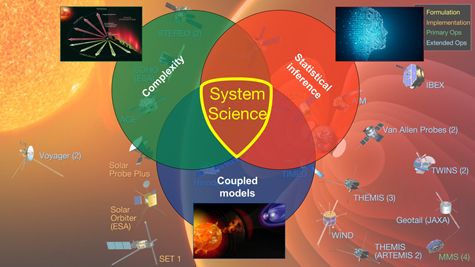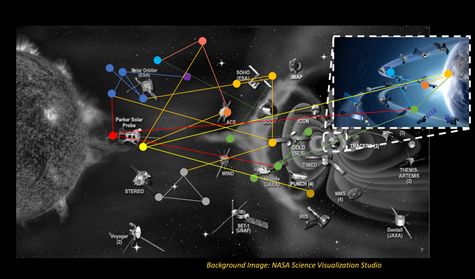Early Career Scientist Spotlight
Dr. Ryan McGranaghan (he/him)
Principal Data Scientist | Aerospace Engineering Scientist
Ionosphere, Thermosphere, Mesosphere Physics Laboratory (675)
What science questions do you investigate?
This is a tough one to answer because I’m always asking new questions. I carry around a notebook that is filled with questions, new science questions, general interest, things I might call ‘threshold questions.’ Questions are how we palpate the unknown. Here are some specific science questions that have been animating me for the past few years:
-
Solar Wind-Magnetosphere-Upper Atmosphere System: How does energy couple from the solar wind to the magnetosphere and down into
our upper atmosphere? What are the spatial and temporal characteristics of this coupling between systems and how do those
characteristics change across scales?
Space Weather: Connecting scientific knowledge of the Earth and Space environments to their societal impacts, how do we improve the resilience of our critical societal infrastructure like the power grid?
Complexity/Systems Science: How do we do systems science for Heliophysics (specifically in the near-Earth space environment, geospace)? What are the system properties of the geospace system? What new mathematical techniques and methodologies are required to progress geospace system science? In the context of funding, observational limitations, and the advent of sophisticated new tools to perform data-driven discovery, how can geospace system science be advanced?
Credit: Nick Watkins, Jeff Thayer, and Ryan McGranaghan
Published in Eos
How did you end up working at NASA Goddard?
My early career has been marked by a desire to cultivate a diversity of experiences--different institutions, different environments, and different topics. That led me from Tennessee to Boulder, Colorado for my PhD work under the National Science Foundation (NSF) Graduate Research Fellowship, to Dartmouth College where I was the Visiting Research Professor in 2016, and myriad other research stops, including Los Alamos National Laboratories, the National Center for Atmospheric Research High Altitude Observatory, and the NASA Marshall Space Flight Center. In 2018, I received the illustrious NASA Living With a Star Jack Eddy Postdoctoral Fellowship which I used to spend two years at the NASA Jet Propulsion Laboratory. In January of the final year, someone who I did not yet know but would come to be a close colleague and dear friend visited the lab to give a seminar—Barbara Thompson. The passion and openness with which she pursued her research and fostered collaboration immediately drew me to her. I made a visit to her home institution, NASA Goddard, the following March when Barbara and a few others were in the process of defining a new research center to focus on using data science and machine learning to dramatically expand the discovery potential for heliophysics and space weather science. I was fortunate enough to join that core team to grow the new Center for HelioAnalytics and I moved to the east coast following the conclusion of my fellowship.
What is one research project that you are particularly excited about, and why?
The Heliophysics KNOWledge Network (Helio-KNOW) is the collection of software and systems for improved information representation in Heliophysics, and the commons for the community to use and collaborate through them. Helio-KNOW is the technological framework for a more informed, participatory, and collaborative Heliophysics community.
The world is increasingly interconnected and complex. The information our world now creates has placed discovery at our fingertips, but ironically the sheer amount of those data (the volume, the sources, the heterogeneity) is a crippling deluge. How do we better handle this information overload and instead harness the power of these data?
Embrace a more natural structure for the data: a knowledge graph (KG) in which the relationships between data are explicit. The graph structure is more capable of holding the world's information, even better than a spreadsheet. It would be like trying to capture your own social circles in a spreadsheet.
KGs have altered the very foundation of many domains in the 21st century. Yet their potential has not yet been realized in many science and engineering disciplines, one of the most important to our human flourishing as a space-faring species is the space environment. What if we had a KG for the space environment, to study its variation (i.e., Heliophysics)?
Helio-KNOW is the effort to structure information about the space environment as a KG, better organizing the data for scientific discovery and better preparing humanity to understand space.
Helio-KNOW goes beyond simply the Heliophysics domain, growing the KG into a Knowledge Network, connecting to all domains.
Helio-KNOW is also an attempt to be an exemplar of Open Science. Join the community! https://github.com/rmcgranaghan/Helio-KNOW.
Credit: (background image) NASA Scientific Visualization Studio; (design) Ryan McGranaghan
What aspect of your work excites you the most?
I try to take multi-disciplinary (what I have called ‘antidisciplinary’) approach to the study of space, bringing together traditional space physics with innovation from the field of data science. Note that I use antidisciplinary to mean increased plurality of thought and transdisciplinary connections, not to mean ‘against’ disciplines.
The ‘discipline’ of Heliophysics is inherently transdisciplinary and requires solutions that address the cultural as well as the technical challenges. I’m most excited by the developing this new sensibility of antidisciplinary that can overcome the cultural challenge that is guided by plurality of thought and the science of team science. This pairs team science with scientific research that allows us all to take a more holistic perspective, to have healthier research teams and communities, and contributes back to the progress of science.
Lately, my approach has been to improve the data and knowledge infrastructure to expand disciplinary boundaries and enable open and inclusive science. As our society expands technologically and physically into space, our flourishing is inextricable from the space environment. However, our data and knowledge infrastructure has not kept pace with this rapid change. I believe that the concept of a ‘knowledge commons’ can be a solution. A knowledge commons is a combination of intelligent information representation and the openness, governance, and trust required to create a participatory ecosystem whereby the whole community maintains and evolves this shared information space [McGranaghan et al., 2021].
I’m passionate about communicating science, considering myself as something like an entrepreneur of science. I was selected to give a TED talk in April 2015 on the topic of space weather, and I continually strive to move audiences and more effectively communicate science through compelling storytelling and data visualization. I believe communication is a frontier of science and that we must communicate across registers, across media, and across scales. Part of that has been one of my passions over the past few years -- a podcast I host and produce called Origins. Origins are conversations with thought-leaders across an eclectic mix of disciplines (science, engineering, art, and design), crafted specifically for the category-defying society that we live in.
What was your first big research achievement?
During my PhD work, I won the prestigious NSF Graduate Research Fellowship. Over a period of just 30 months, I replaced two 30-year old models/procedures for calculating upper atmospheric conductance – a fundamental, but unmeasured link between the ionosphere and magnetosphere – with a single, unified procedure with higher fidelity that could be extended to three dimensions. That work was synthesized in my thesis entitled "Determining global ionospheric conductivity in the satellite and data assimilation age and assessing its influence on the magnetosphere-ionosphere-thermosphere system." That work brought together a new data set (consisting of ~100 million precipitating particle spectra) and innovative methods for extracting information from these data in order to bear on the long-standing problem of time- and space-variable electrical connections between the magnetosphere and ionosphere.
If you were to expand your current research focus, what new topics would you explore?
Michael Polanyi wrote, "We know more than we can tell." To which I will add that we tell more than we can write. So, I will be deliberately brief in this response. I’m fascinated by many things and the list grows every day.
Network science. In the words of Stephen Hawking, the 21st century will be the century of complexity, and networks are at the heart of representing and understanding complex systems. A network is a way of representing the components of a system and their relationships. Networks are everywhere, from our internet and communication systems, to the power grid, to our social relationships. Once you recognize this, you will start seeing the roles of networks in everything. We’ve been able to bring the concept to the Earth and space sciences in a variety of ways (e.g., McGranaghan et al., [2017]), but there are immense opportunities.
But there are many other interests that I have not mentioned. I believe in being led around by your curiosity, being in a state of spaciousness, being teachable, and being a student. A couple of quotes that I carry around with me:
“Nobody ever figures out what life is all about. It doesn’t matter. Explore the world. Nearly everything is really interesting if you go into it deeply enough.” -Richard Feynman
“This an interesting planet. It deserves all the attention you can give it.” -Marilynne Robinson
What is a fun fact about you?
My latest and most consuming passion is being a father, and a husband to a mother. In May 2021, my wife and I had our first child, Stella. The past year has been an opening to a whole new part of living.
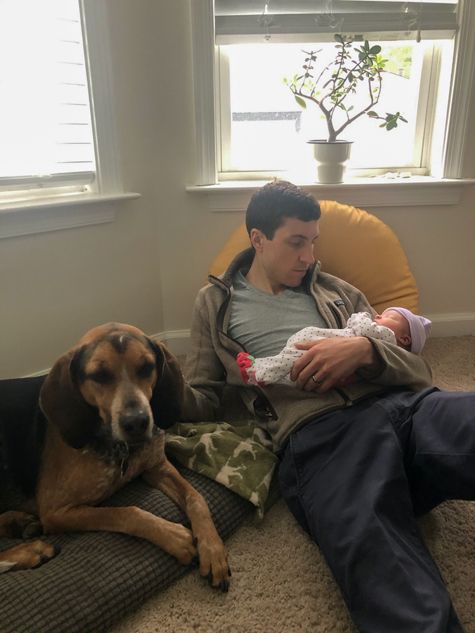
Credit: Rachel Bush
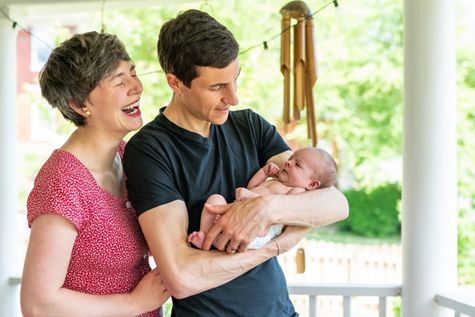
Credit: Myrna Bush
Biography
Home Town:
Knoxville, TN
Undergraduate Degree:
B.S. in Aerospace Engineering, University of Tennessee, Knoxville, TN
Post-graduate Degrees:
M.Sc. in Aerospace Engineering Sciences and Astrodynamics, University of Colorado Boulder, Boulder, CO
Ph.D in Aerospace Engineering Sciences, University of Colorado Boulder, Boulder, CO
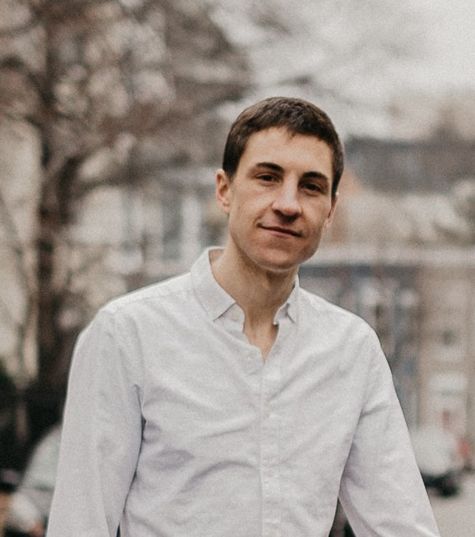
Link to Dr. McGranaghan's GSFC Bio

